Contemporary music festivals are not just a source of experiences and entertainment for participants, but also a significant component of the business ecosystem, generating demand for services in gastronomy, media, and maintenance. On August 4, 2023, social media was abuzz with the unexpected news of the cancellation of the Fest Festival. At the same time, news emerged about the initiation of restructuring proceedings (initially incorrectly reported as bankruptcy proceedings) of the responsible company (FEST FESTIVAL sp. z o.o. based in Warsaw).
In their official statement on Instagram, the organizers cited financial difficulties caused by inflation, the conflict in Ukraine, and weaker-than-expected ticket sales. The justification, of course, did not include an admission of a lack of budget planning skills, risk management, or, in essence, the organization of music festivals. The reactions were immediate – questions about ticket refunds and concerns about other upcoming festivals became the number one topic. Was the fate of the Fest Festival predictable?
We learned about the scandal caused by the Fest Festival by chance, from our client for whom we are creating a system for assessing the credibility of counterparties. In the Support team's inbox, one of the users of the counterparty verification platform Temida left a message:
"Congratulations, the company announced bankruptcy proceedings yesterday, and your indicators predicted it (...)"
As early as May 2023, Fest Festival Sp. z o.o. was marked on the Temida.io platform as an entity belonging to the highest-risk group. Additional information indicated that the company's financial data pointed to a difficult financial situation and a high risk of insolvency and, consequently, bankruptcy. Everything indicated that the company was on the verge of ceasing operations.
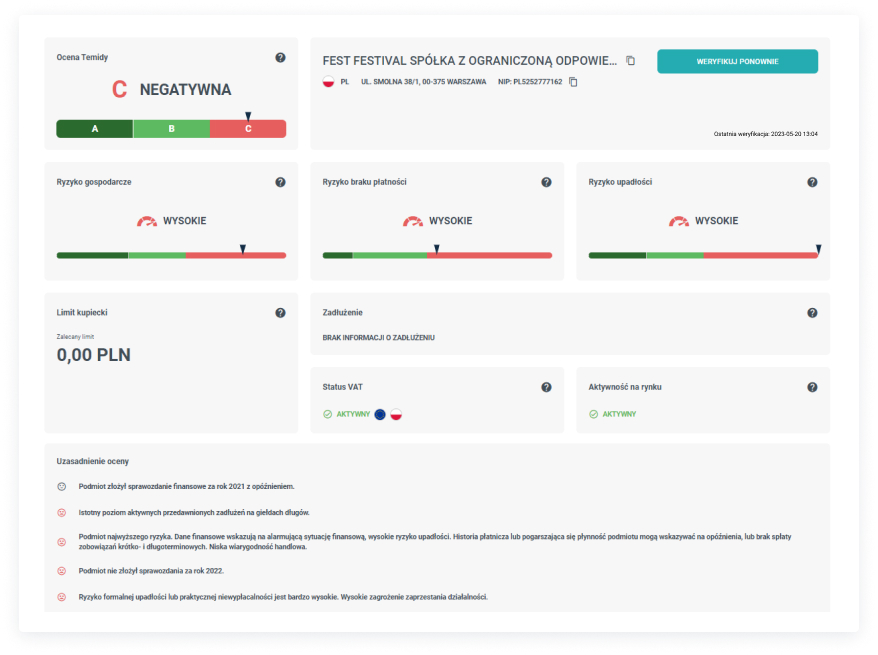
The Wheel of Financial Misfortune
An analysis of the financial statements indicates that the problems of the Fest Festival did not begin with the difficulties of organizing this year's edition. Basic financial metrics included in the company's financial statement for 2019 (the first edition of the FEST) indicate operational unprofitability: revenues at the level of 6.8 million PLN versus operational costs exceeding 10.3 million PLN. The result? An operating loss (EBIT) of over 3 million PLN. Given the limited reporting requirements for limited liability companies, the reader could infer that the start was unsuccessful.
The year 2020 brought a global crisis in the form of a pandemic. This also affected the fate of the Fest Festival - the second edition, scheduled for that year, was postponed to 2021. As a result, in the report for 2020, the festival recorded zero revenue and additional costs - this time over 280 thousand PLN, mainly related to maintaining operations.
After a year of epidemiological bans, 2021 brought hope for better days for the event sector. The FEST Festival took place. The company's revenue nominally increased compared to the 2019 edition. Unfortunately, the cost base again exceeded revenue with operational costs reaching 19.1 million PLN. This resulted in a net loss of another over 3 million PLN.
By the time of publication of this article, the deadline for submitting financial reports for 2022 had passed, and the Fest Festival had not fulfilled this obligation.
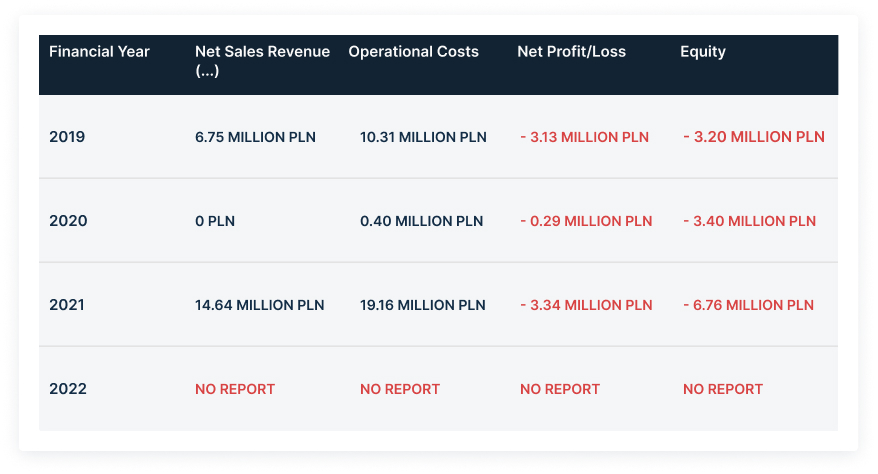
The income statement is just a part of the entire financial puzzle, which is multi-element and requires a parallel comparison of financial metrics. Continuing the analysis of the Fest Festival company, it is difficult to find any information indicating a positive financial condition. Negative equity appeared in the reports as early as 2019 and deepened its negative value in subsequent years, meaning that in addition to incurring losses on capital, no funds were provided to the company to continue operations (either capital or debt financing).
From the beginning of its operation, the company did not have sufficient funds to pay its liabilities. From that moment on, the situation only worsened.
It is crucial to understand the scale of the problem and its effects – many suppliers and creditors did not receive their due funds for services related to organizing the festival. It seems that the next edition was an attempt to replenish the budget to cover previous debts. Unfortunately, organizing another edition of the festival only worsened the situation. Liabilities continued to grow faster than the company's assets – leading to a dangerous spiral of debt.
If we assume that in 2022 and 2023, i.e., during the third and fourth editions of the festival, the situation repeated itself, it is no wonder that we eventually see the situation we observe today. For creditors, mainly entities providing services related to, among others, organizing the festival, the cup of bitterness may finally have overflowed. If ticket sales were worse than expected in 2023, revenues were probably finally insufficient to cover, among others, past liabilities. During the festival's organization, companies refusing services due to arrears in payments can be listed only until the "bad reputation" catches up with the organizers, and no one will perform services on the terms of delayed payment.
Unfortunately, these hypotheses find confirmation in reality. Everything indicates that ticket sales from subsequent editions were used to cover overdue liabilities related to organizing previous editions of the festival.
Gazeta Wyborcza reports that in November 2022, a few months after the end of the third edition of the festival, some people complained about not being paid for catering and tattoo services during the event. Interestingly, these entrepreneurs did not have the opportunity to use their payment terminals. Instead, all profits were supposed to go first to the festival organizer's account, even though the entrepreneurs bore the costs of organizing these services. Such actions could suggest that the organizer used the collected funds to patch budget holes and repay the most urgent debts. Until November 2022, many suppliers were waiting for their due money, while others received it with disturbingly large delays.
On the Temida.io platform, in the report about the organizer of the Fest Festival, Follow The Step Sp. z o.o., we find information about a significant amount of overdue debts reported on debt exchanges. Problems with timely payments and the bad reputation of the organizers were the final nail in the coffin. Journalists from Wyborcza reached people confirming that the festival was ultimately canceled after some performers demanded upfront payment. There is another fact that makes the situation related to the Fest Festival suspicious. According to the entries in the National Court Register (KRS), the financial statements for 2019, 2020, and 2021 were submitted collectively, and only on May 23, 2023.
This certainly does not testify to transparency and a sense of responsibility of the company's management. Such action means that the management either tries to conceal the true financial condition and problems of the company or conducts business without having basic knowledge of the requirements for running a limited liability company.
There are more warning signs. One of the partners decided to sell his shares in Fest Festival sp. z o.o. on September 26, 2022, right after the end of the last successful edition of the festival. Can this be seen as an attempt to quickly leave a ship sinking in debt?
As for the main question of our article: "Was it possible to predict the fate of the Fest Festival?", the answer is simple: yes, it was. However, this answer could only become clear to the public on May 23, 2023, when many festival enthusiasts had already purchased tickets for the upcoming edition. Some of them, unfortunately, may be left empty-handed and never recover their money.
Follow the Misstep
Fest Festival Sp. z o.o. is a perfect example of a complex network of business connections that seem to fall into the same pattern of financial problems. Follow The Step Sp. z o.o. might be one of the most notorious examples, but it is just the tip of the iceberg when it comes to controversies related to its owners. Both are involved in several ventures in the music and festival industry, many of which also struggle with financial problems. Here we can mention a few well-known brands: Smolna38, Praga Centrum, Luzztro, and Wisłoujście Festival - a total of over 9 companies. Fest Festival Sp. z o.o. is not the first company whose debts are now publicly discussed.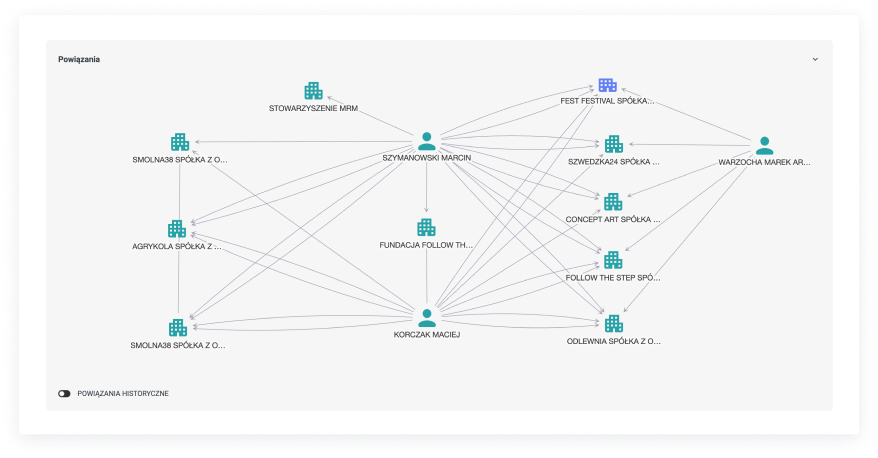
For example, as reported by the Press Service, Follow The Step had problems for many months with making payments to musicians and DJs. Another example - in May, national media reported a situation in which people associated with the agency allegedly used intimidation and aggression against Michał Urbaniak, the lessee of the property where the Praga Centrum club operated. Two-year arrears in payments for the premises amounted to half a million PLN.
It is worth noting that financial problems are not the only common point between different companies managed by the same group of people. There is also a clear pattern of avoiding transparency, as evidenced by the failure to submit financial reports by Follow The Step sp. z o.o. in 2020 and later. In light of the published reports for 2018 and 2019, the company's operational profitability could have been higher, and the lack of data for later years only deepened the uncertainty regarding its financial situation.
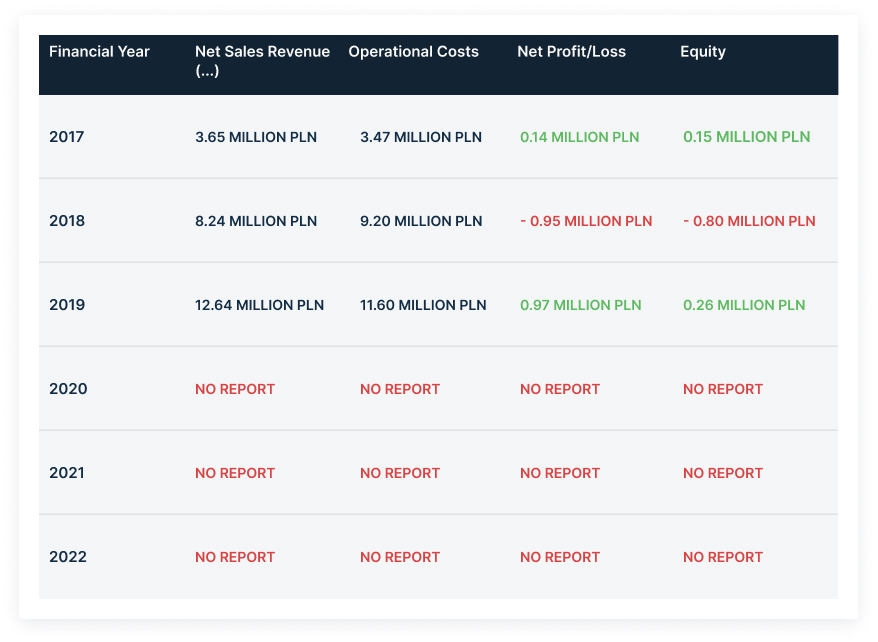
Neglecting the Reporting Obligation
In Poland, capital companies (e.g., limited liability companies or joint-stock companies) are obliged to submit financial statements to the National Court Register (KRS). For any business entering into relations with companies that have not submitted such reports, this should be a red flag. Many entrepreneurs use professional business intelligence services to verify the financial capacity and credibility of potential business partners. In the case of Fest Festival and Follow The Step, such a check would undoubtedly have revealed serious problems.
If the absence of mandatory financial reporting causes damage to other entities (e.g., contractors, investors), board members may be held civilly liable for these damages – the facts indicate that this was precisely the case here.
Entities owned by individuals known from the Fest Festival's board seem unconcerned about potential consequences. Apart from Fest Festival sp. z o.o., none of the companies owned by Marcin Szymanowski or Maciej Korczak submitted reports from 2020.
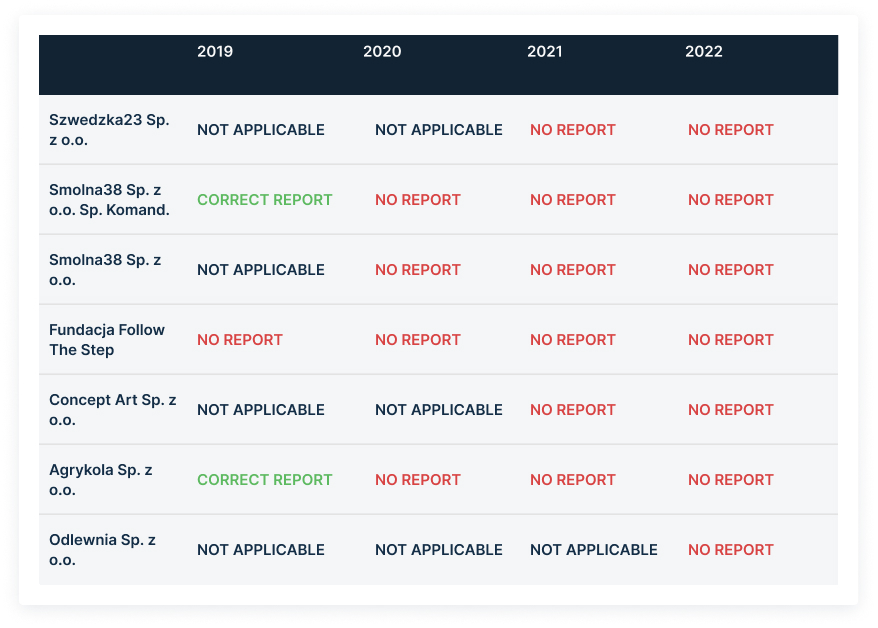
What About Other Festivals?
Follow The Step is also responsible for the OnAir festival – which has already been canceled. Until August 10, 2023, the current partners of Fest Festival Sp. z o.o. were also shareholders of Festiwal Wisłoujście Sp. z o.o. On August 10, 2023, they were removed from the KRS as shareholders. Naturally, this raises the question – could Festiwal Wisłoujście be in a similar situation to Fest Festival? In this case, the situation is much better. Mandatory financial reports have been submitted, painting a much more positive picture. The scale of this festival is much smaller than "Fest," but over nearly a year and a half of operation until the end of 2021, and for the year 2022, the entity reported profits.
Consumers as Creditors
Unfortunately, in the case of the Fest Festival, consumers and festival volunteers (volunteers were required to pay a 700 PLN deposit for the festival) became one of the links in the chain of creditors. Unlike business entities, which usually understand the risk of settling accounts on deferred payment terms, festival participants are not in the habit of analyzing the financial condition of the organizer before purchasing a ticket.
All information indicates that Fest was doomed to fail, and it was hard to be under any illusion that after several years of systematic losses, the situation would finally turn around. The organizers tried to prolong the life of the festival until the last moment – reportedly, tickets were sold up to the day bankruptcy was announced. If, as the organizers say, there was a shortfall of as much as 5 million PLN at the time of the bankruptcy announcement, then isn't selling tickets until the last moment a fraud? Lawyer Michał Gajda, in the Press service, calls this sale a crime, referring to art. 286 par. 1 of the Penal Code.
Ultimately, instead of a bankruptcy process, a restructuring process was initiated in the hope that the company would regain liquidity. One thing is certain – after the embarrassment and scandal, the Fest brand will never return to the market, and the Follow The Step agency should cease operations. The owners and boards of both companies prove that they are incapable of running a credible business and do not care about the obligations imposed on companies by the Commercial Companies Code. Referring again to the official statement published by the organizers on Instagram – they blame the situation on the war in Ukraine, inflation, and poor ticket sales. Everything except their incompetence in organizing events or managing the company's finances. The evidence paints a somewhat different picture.
Risk-Free Business - How to Shift Responsibility to Consumers
While Fest Festival Sp. z o.o. enters the restructuring phase, new developments are emerging regarding compensation for the aggrieved. According to information provided by the Koncerty w Polsce profile on Facebook, the organizers offered people who purchased tickets for the canceled festival compensation in the form of a pass for the next edition and a 50% discount on the event planned for 2025.
The latest information indicates that people still waiting for a refund of ticket costs have received letters from the company regarding the restructuring plan. The proposals included allow for the acceptance of the offered compensation or its rejection. In the event of rejection, there is a fear that this may lead to the bankruptcy of the company, leaving the aggrieved without compensation. Those interested in participating in the voting process over the restructuring plan could do so by filling out a special card and sending it through the National Debt Register portal by November 8, 2023.
This situation sheds light on the complex nature of crisis management in the festival industry, as well as the responsibility that festival organizers bear towards their participants and partners.
Our AI models warned of these problems as early as May 2023 (at the time of the publication of financial reports for the period 2019-2021 by Fest Festival).




